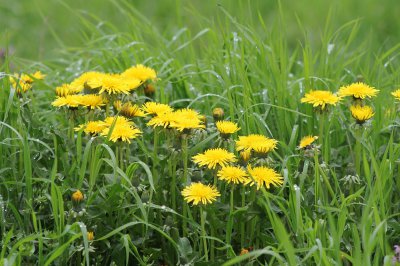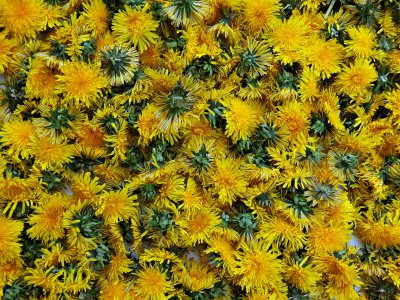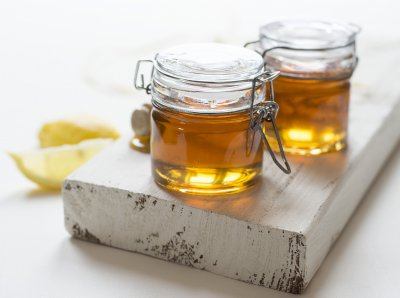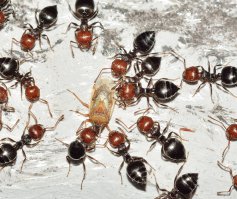Dandelion, dandelion and milk
The dandelion (Taraxacum officinale in Latin) is also known as the common dandelion and blower. It is present in European countries, it also grows in Asia and in North and South America. Most gardeners treat this plant like a weed. This is a mistake, because the dandelion is characterized by numerous healing properties.
Dandelion - a root full of health
 Nun is a plant that can be found most often on roadsides, but also on meadows or in home gardens, where it is treated as a weed. Many people are not aware of the many healing properties of the dandelion. It is worth remembering that this inconspicuous plant finds many applications in natural medicine. In this case, the roots of older plants are used, which must be harvested in the autumn. They must be properly prepared: excavated from the ground, washed, the part growing above the ground removed and then dried in natural conditions or in a heated drying room - thanks to which the herb of the dandelion is obtained. In spring, the aboveground part of the dandelion should be cut off and then dried in the shade. Then you get the common dandelion's herb. While the plant is in bloom, you can also collect flowering flower baskets, which can also be dried to obtain the dandelion flower.
Nun is a plant that can be found most often on roadsides, but also on meadows or in home gardens, where it is treated as a weed. Many people are not aware of the many healing properties of the dandelion. It is worth remembering that this inconspicuous plant finds many applications in natural medicine. In this case, the roots of older plants are used, which must be harvested in the autumn. They must be properly prepared: excavated from the ground, washed, the part growing above the ground removed and then dried in natural conditions or in a heated drying room - thanks to which the herb of the dandelion is obtained. In spring, the aboveground part of the dandelion should be cut off and then dried in the shade. Then you get the common dandelion's herb. While the plant is in bloom, you can also collect flowering flower baskets, which can also be dried to obtain the dandelion flower.
Cancer monk?
According to researchers in Ontario, a dandelion can be a cure for cancer. According to their research, the condition of some people with cancer is improved by drinking dandelion tea. People with leukaemia and lymphoma, who were not affected by traditional procedures, were examined. One of the researchers says that the positive action of the nun was rather short-lived, but believes that it is a good sign and that it is worth continuing with similar research.

Dandelion - use
The dandelion should be used, among others, by people with digestion problems. The nun stimulates the production of bile and also supports its flow to the duodenum. Thanks to this, the body prevents bile stagnation. Additionally, dandelion increases gastric juice secretion. According to natural medicine, it is worth to use nun products in case of diseases that may cause liver damage or reduce the amount of bile produced. These include hepatitis or the onset of gallstones. It is recommended to use the dandelion also in case of gastric juice deficiency.
In case of problems with digestion, dandelion broth from the root of the dandelion works well. Making the broth is not difficult - it is necessary to prepare two tablespoons of shredded roots and then pour 500 ml of boiling water over them. The next step is to cook the stock for 10 minutes (the stock should be cooked under a lid). When the broth cools down, it should be strained. The drink should be drunk 2-3 times a day before meals. It accelerates digestion and also has a diuretic effect.
Dandelion - diabetic properties
The common monk is also an antidiabetic agent. The plant contains inulin, which slows down the process of blood sugar absorption and lowers the glycemic index of the taken food. Diabetics should reach for inulin, as it also has a glucose lowering effect.
Diuretic nun - diuretic properties
 The diuretic nun also has diuretic properties. It is also important that some of the substances contained in this plant have a detoxifying and purifying effect. Some people even talk about "cleaning the blood". It is recommended to take dandelion products in case of people suffering from diseases with impaired glomerular function, as well as with reduced urine intake per day. It is advisable to take nun products also in the case of people with rheumatism or obese.
The diuretic nun also has diuretic properties. It is also important that some of the substances contained in this plant have a detoxifying and purifying effect. Some people even talk about "cleaning the blood". It is recommended to take dandelion products in case of people suffering from diseases with impaired glomerular function, as well as with reduced urine intake per day. It is advisable to take nun products also in the case of people with rheumatism or obese.
Dandelion to immunity
The plant has a very good effect on the phagocytic activity of white blood cells, and it probably stimulates the formation of interferon, which has an antiviral effect. This is why the dandelion can be taken by elderly people with a weakened body and people with high susceptibility to various infections and viral diseases.
 Nun for slimming
Nun for slimming
As already mentioned, the dandelion contains inulin, a substance which is known for its low calorific value. It is ten times less sweet than sugar. In addition, inulin reduces appetite, but increases the feeling of satiety, which makes it easier for those who take it to control the amount of food they are taking. It is worth reaching for it in order to be able to take advantage of its benefits.
Nun and skin diseases
The use of the dandelion for external wounds improves healing. In addition, the plant helps to get rid of unsightly warts and warts. For this to happen, fresh leaf packings should be used.
Dandelion syrup - recipe
Syrup made from dandelion flowers is usually used by people suffering from sore throat or respiratory infections. It is worth knowing that in addition to its anti-inflammatory and antiviral effects, nun honey also has other properties, such as antiatherosclerotic and detoxifying effects. That's why it should be in every home first-aid kit.
The flowers of the dandelion should be harvested in May, on a sunny day. They should be harvested before noon, because this is when the flowers are most open. Important! It is not possible to collect flowers growing wildly by the roads - it is worth going to the meadow to get the flowers of the dandelion.
 Ingredients needed:
Ingredients needed:
- 1 litre of milk flowers
- 2 lemons
- 1 litre of water
- 1 kg sugar
Preparation:
Put the flowers in a pot and pour cold water over them. Cook them over low heat for about 15 minutes. The next step is to leave the cooker in a cool place, preferably for 24 hours. After this time, the decoction is strained and then the juice squeezed out of the lemons and sugar is added to it. Mix everything together and then cook over low heat until the consistency of honey is obtained. Pour the syrup into jars. It should be used within a few months of its preparation.















